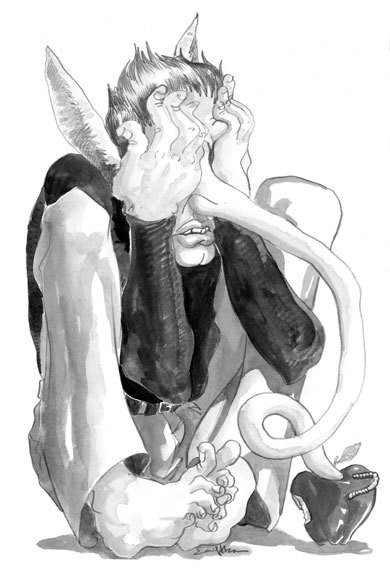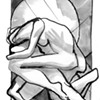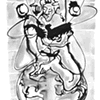We were all wrong.” So reads the cover of the February 5 edition of Newsweek, quoting David Kay, the former chief weapons inspector in Iraq. With this, Newsweek gave new meaning to the term “cover story.” The front page depicts Bush, with his permanently imprinted, whiny, “I didn’t do it” expression.
There is Blair, looking like he learned everything he knows in Catholic school. Rumsfeld, whose face always reminds me a lot, not a little, of any Nazi you care to name. Powell—earnest, indignant, and spouting utter nonsense. Rice, always looking like she’s in the midst of a petit mal seizure: it’s her eyes. Cheney, one side of his lip raised, snarling all the way to the investment bank. Tenent, who would look no different if Matt Groening drew him into “The Simpsons”.
We’re supposed to believe these people? They made a little mistake and bombed Iraq and killed and maimed thousands who were minding their own lives, ditched the us military in the desert for what may work out to be decades, blew the federal budget, drove the leader of a sovereign state from office, and have so far wasted the lives of nearly 550 of our soldiers—all by accident?
It’s either that or you need a good conspiracy theory. We all know that the moment we say, “These people knew exactly what they were doing; they lied to us,” there’s always one idiot in the room who pipes up and says he doesn’t believe in conspiracy theories. The implication is that if you believe that the people in the White House, the Pentagon, and the corporate community (to the extent that they are even different people) work together for certain common purposes, you have a soft mind, you draw conclusions where you don’t have facts, and you’re basically a fool.
We have just about all fallen for the same line on the September 11 scandals—that FBI memos warned of the attacks; that Bush was briefed on August 6, and everyone looked the other direction; that once the cataclysm occurred, they seized control of the world amidst great panic and fear. Then came a series of domestic crackdowns on freedom and privacy along with two long, ongoing, bloody, and expensive wars. If anyone is in doubt as to why, run the film clip of the World Trade Center falling down.
Over the course of a reporting career spent untangling the lies of government and corporations, I have become fascinated with why people believe lies. Even as lies and liars are exposed again and again, people still believe them, and often with a devotion that verges on religious fervor. Some suggest this is a form of addiction to deception.
Most recently, I’ve taken an interest in the history of Watergate, the scandal that gives every other scandal its last name—Contragate, Travelgate, Botoxgate. Watergate started with the lucky bust of a late-night break-in at the Watergate hotel and office complex in the spring of 1972. Five burglars, with lots of cash in their pockets, were arrested planting bugs at the Democratic National Headquarters. There was a cover-up; what was being covered up turned out not to be the bugging itself, but rather the existence of a vast espionage and harassment network involving the FBI and the CIA that was designed to destroy any and all of Nixon’s enemies.
Nixon, of course, said he was clueless.
Two young reporters at the Washington Post, following hunches, clues, and contradictions in the official story, made Watergate what it eventually became—the only scandal to result in the resignation of a us president. But remarkably, over the subsequent six months, even as the conspiracy reached higher and higher into the administration, people still believed that the president could never have been involved. Nixon was reelected in November of 1972 by a landslide, winning 49 states. He then survived another 18 months in office, resigning only when impeachment was imminent.Despite countless accusations made against the Washington Post of partisan political motives, it turned out that every member of the administration was involved.
The lies and official denials took their heaviest toll on network executives and newspaper editors who either feared retaliation or were too closely involved with the political process and the people in it to see clearly. In other words, there were a lot of good Republicans at the helm of important media, and it took them quite a while to catch on or, alternately, to come out of denial trips. Some feared that the story would be too messy for the public to deal with. There were other issues: no easy visuals for tv; too many angles to cover; sources who would not give their names. The story reached so far and in so many directions that it could never be summed up in two minutes, the length of the average news story. In such an atmosphere of denial, deception festers magnificently, and we continue to live in it today.
We all process reality the same way, our perceptions shaped by pre-existing beliefs. One common belief is that something too complicated can’t be true. Our naiveté, apathy, fear, or idealism makes us easy to co-opt through sloganeering: “We must stand strong” or “The economy is at stake” or “The President would never do that” or “The administration would never lie.” In essence, we’re talking about an ideological comfort zone.
Why do people believe lies? We want to believe that life is neat and orderly, that people are trustworthy, that our elected officials speak honestly. But the truth is that power corrupts; and the powerful often act out of greed, conspire together to deceive, violate our freedoms, and undermine our interests to their benefit. To accept a lie, we need do nothing. To understand a lie and seek the truth, we have to understand a complicated set of facts that expose that lie; we have to get involved with the whole disgusting process of the deception in order to understand it. It’s extremely uncomfortable: it requires speculation, and it takes time and effort.
Then, in the end, we have to admit that our instincts failed us. Many people are so attached to being right that they get duped. Con artists know this well.
Where issues of national security are concerned, we are often frightened into willful gullibility. When threatened with social unrest, economic instability, terrorism, or communism, people will usually go along to get along. You don’t have to take responsibility for your choice; you’re just being a good citizen.
Which leads me to Bliss, Capen, Gage, and Scudder residence halls at suny New Paltz, the subject of my February column. These buildings were contaminated with pcbs and dioxins in a chain-reaction series of transformer explosions in December 1991.
I spent a day at suny New Paltz last month, speaking with students and touring two of the contaminated buildings. It was creepy to walk through the corridors of places I know were contaminated (I have file drawers full of evidence) and to see students living in them, all warm and cozy as if nothing was wrong. I was, of course, filled with the urge to start knocking on doors and warning people, but I kept to my journalistic mission of sizing up the situation and collecting facts.
It helped that, hours earlier, my day on campus had begun with a conversation with a vegan activist who was giving out literature in the Student Union Building. Veganism is good for your health, in that by not eating animal products, you’re eating lower on the food chain, and hence you take in far fewer pcbs and dioxins through your diet.
I asked her what she knew about the situation, and she said that she lived in Bliss Hall. On the first day of school this year, her roommate’s mother was in their dorm room extremely upset because, one way or another, she had heard about the situation. (Contamination in Bliss reached one million times the state’s “safe toxins” level. Dioxin was found on the third floor. Student property in the building at the time of the transformer explosion was put into a toxic waste dump near Niagara Falls.)
Despite the vocal protests of one roommate’s mother, both girls still live in Bliss Hall. They cannot plead ignorance, and our vegan activist cannot claim she’s someone who lacks social concerns or trusts McDonald’s. It’s not like she doesn’t know the stuff can hurt her. She and her roommate just live in a comfort zone.



















